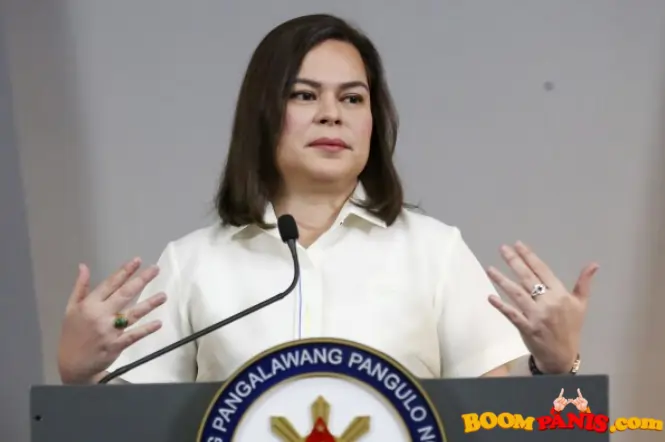
Sara Duterte’s Political Strategy: Silence or Power Move?
In 2025, Sara Duterte’s political strategy is under intense scrutiny, especially in light of her father’s ongoing legal troubles. Former President Rodrigo Duterte is currently detained at the International Criminal Court (ICC) in The Hague, facing charges of crimes against humanity tied to his war on drugs during his presidency from 2016 to 2022.
Sara Duterte has publicly condemned her father’s arrest, calling it politically motivated. She claims the charges are part of a broader campaign to weaken their family’s political influence. This firm stance has deepened the political divide between her and President Ferdinand Marcos Jr., who has expressed support for the ICC investigation.
The issue has sparked nationwide protests from Duterte supporters, demanding the former president’s release. These events not only reveal intense political divisions but also emphasize the difficult terrain Sara Duterte must navigate. Her actions, or lack thereof, reflect the direction and risks of Sara Duterte’s political strategy amid growing public and political pressure.
As the country moves closer to the 2028 presidential elections, her response to these events and her political decisions will shape both her candidacy and the Duterte legacy in national politics.
Political Background and Recent Activity
Sara Duterte, daughter of former President Rodrigo Duterte, began her political career in 2007 as Vice Mayor of Davao City. She later served as Mayor from 2010 to 2013 and again from 2016 to 2022, becoming the city’s first female and youngest mayor.
In 2022, she was elected as the 15th Vice President of the Philippines, running alongside President Ferdinand “Bongbong” Marcos Jr. under the UniTeam alliance. Concurrently, she served as Secretary of Education until her resignation in July 2024.
In 2025, Duterte’s public presence has diminished, coinciding with her father’s legal challenges at the International Criminal Court. Her political strategy during this period appears to involve reduced public engagement, possibly to navigate the complex political landscape and familial controversies.
Silence as a Strategy
Sara Duterte’s silence in 2025 is not accidental—it appears to be a calculated political move. In times of controversy, silence can protect, position, and prepare.
Throughout history, leaders have used silence to their advantage. In the Philippines, Gloria Macapagal-Arroyo often kept quiet during crisis moments, only to return when conditions shifted. Globally, leaders like Germany’s Angela Merkel proved that restraint can project strength.
By staying out of the spotlight, Sara Duterte avoids direct backlash over her father’s ICC case and minimizes conflict with President Marcos Jr. This approach keeps her relevant without making her a target.
Political analyst Cleve Arguelles notes, “Silence signals positioning.” In Sara Duterte’s case, it may be a quiet build-up toward a bigger political comeback.
Her silence isn’t weakness—it might be the strategy that sets the stage for her next move.
Risks and Public Perception
Sara Duterte’s silence may be strategic, but it also raises doubts. In politics, absence can quickly turn into a liability.
Critics say her quiet stance during national issues feels like inaction. On social media, hashtags like #NasaanSiSara reflect growing concern over her lack of visibility. Others see it as detachment during crucial times.
Surveys support this shift. A recent Pulse Asia poll shows that over half of Filipinos expect leaders to speak up during crises—especially when family and national issues collide.
Opposition groups have used her silence to question her leadership. They claim she’s avoiding responsibility and losing her voice in national debates.
If Sara stays silent too long, the damage may go beyond criticism—it could weaken her political brand and voter trust ahead of 2028.
What This Means for 2025 and Beyond
Sara Duterte’s silence is shaping her next political move. With midterm elections near, many believe she’s preparing for a calculated comeback.
Her influence in the Marcos administration has cooled, especially after clashing over her father’s ICC case. This shift signals possible changes in alliances and positioning.
Despite her low profile, her support base in Mindanao remains strong. If she re-emerges at the right time, Sara Duterte’s political strategy could boost her chances for a Senate run—or even a 2028 presidential bid.
Her silence now may be setting the stage for something bigger later.
Conclusion
Sara Duterte’s silence in 2025 is not just a personal choice—it’s a political statement. Whether it’s a calculated pause or a risky retreat, her approach is shaping the conversation around her leadership and future role.
In a time when public voices are expected to speak out, staying quiet has consequences. Sara Duterte’s political strategy may be building suspense, but it also risks alienating voters and weakening public trust.
As tensions rise and the 2028 elections draw closer, Filipinos are watching closely. Is her silence a smart move—or a missed opportunity? The answer may define her next chapter.
What do you think—is silence power, or a problem? Share your thoughts.
Expert Insight
Political analyst Cleve Arguelles shared in a recent interview,
“In Philippine politics, silence can be tactical—but only if timed well. Delay too long, and it becomes political absence, not strategy.”
A Pulse Asia survey released this year revealed that 58% of Filipinos prefer leaders who speak out during national issues, especially involving family and justice matters.
📚 Resources & References
- Rome2Rio – Sara Duterte Travel & Public Appearances
- Pulse Asia Survey Results 2025 – Public Opinion on Political Leaders
- Wikipedia – Sara Duterte Profile & Timeline

Bianca Marie Reyes, aka Tita BoomBi, is a 30-year-old Filipina content creator who turns everyday chika into real talk and real-time news. Known for her witty takes and no-fake-news style, she breaks down viral stories, headlines, and public updates into fun, bite-sized content for the digital Filipino. She’s your online tita, always tuned in and always telling it like it is. With a mix of humour and honesty, she keeps things relevant, relatable, and 100% not fake.
